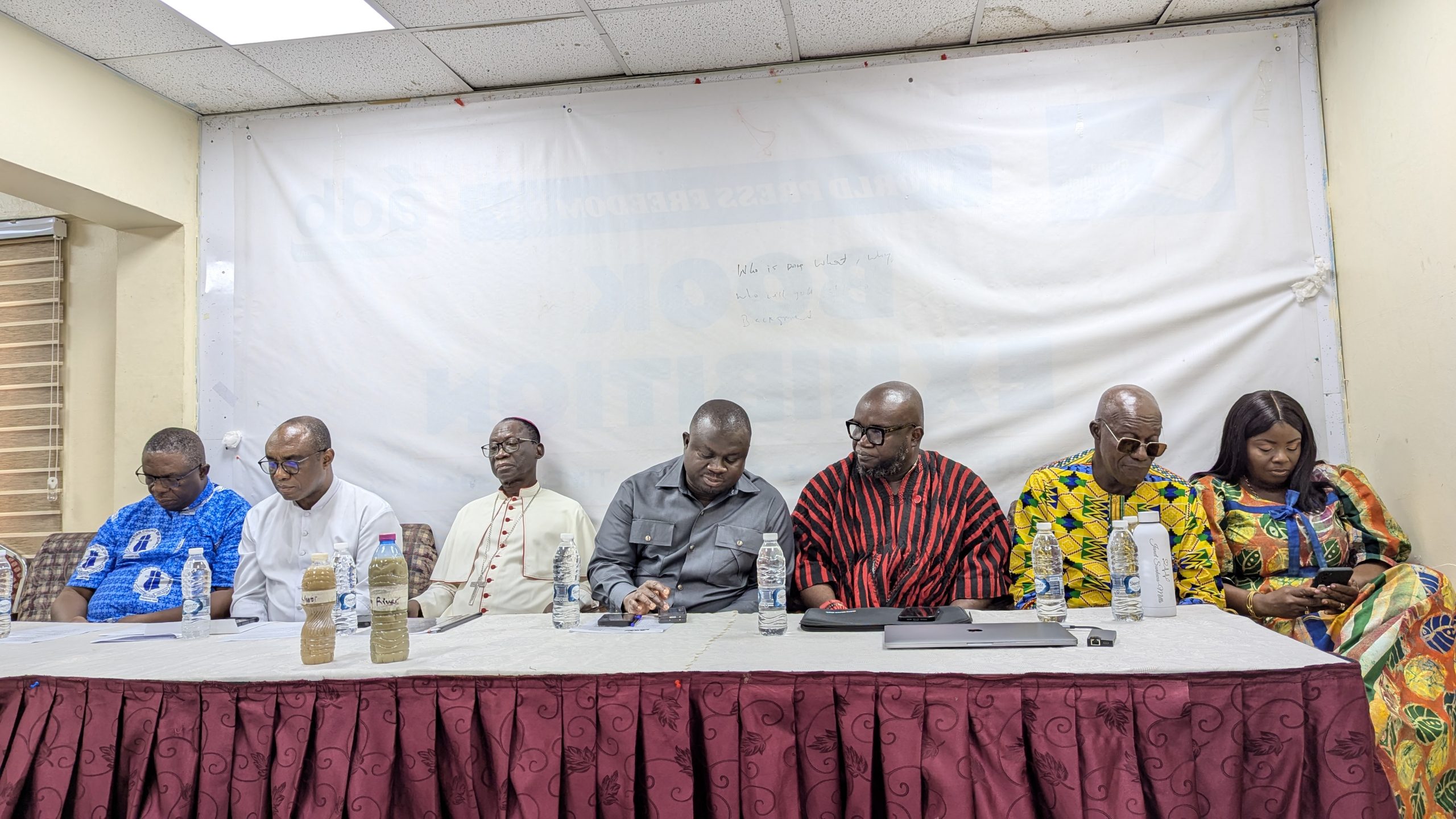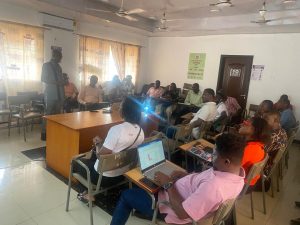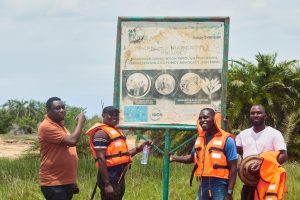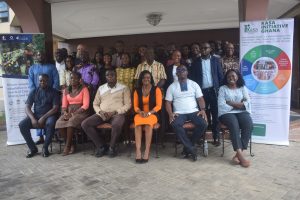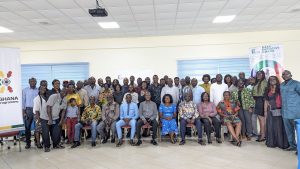11TH September 2024, Accra. RESPONSE FOR POISONED RIVERS URGENTLY
NEEDED
Two weeks ago, a young couple, Evans Dogbe and Kate Agboga, suffered the
unimaginable heartbreak of losing their two precious children, innocent lives cut short by
falling into deadly galamsey pits. In that same devastating time frame, the Ghana Water
Company Limited sounded a desperate alarm: pollution from illegal mining has forced
them to shut down critical water treatment facilities. Communities living near the Densu
River, a crucial source of water lifeline for Accra and flowing from the Eastern Region, are
crying out about illegal miners destroying the Densu. At the same time, the authorities
permit and fail to act swiftly in the face of this injustice after several reports.
Along the Ankobra, Birim, Pra, and Tano rivers, what was once clear and life-sustaining is
now highly polluted, exposing households who have no choice but to drink from these
polluted, contaminated waters to severe health risks, now and in the future. In the Atewa
Forest, illegal miners are brazenly tearing apart this natural treasure, destroying not only
our environment but also the hopes of future generations, broad daylight robbery,
without fear or consequences.
Drive from Accra to Kumasi, and you will witness the heartbreaking destruction of Osino
township, a once-thriving community now reduced to a shadow of its former self. Just
two weeks ago, these miners invaded Konongo, another town falling prey to this
relentless devastation; bear in mind this is the town where a pregnant woman just
attending nature’s call in 2023 lost her life, and another man in 2024 also died in another
Galamsey pit. The less said about the developments in Asankragwa, the better. Critical
roads and transport infrastructure at Anyinam, Enchi, and parts of the Western Region
are under threat of collapse. About a week ago, we heard of the reported incident of
how armed illegal miners chased away an enforcement team of 30, brazenly
undermining the security of the country. As we speak, cocoa farms are being mowed
down by galamsey activities in Sendu and Gwira Banso in the Western Region.
These are not just isolated incidents but the latest accounts of eight years of agonising
tragedies for families that have lost loved ones to deadly pits across galamsey prevalent
regions and communities across the country. Drink or swim from the polluted rivers at your
own health risk, as we are poisoned, slowly exposing us to severe present and future risk
of heavy-metal contamination-induced diseases of the brain and kidney as well as
fertility and reproduction abnormalities.
Our forest reserves and farmlands are being destroyed and degraded with reckless
abandon, all in the name of gold mining or, as the government says, all in the name of
making Ghana the mining hub of Africa. In the mining communities, law and order are
crumbling under the weight of impunity, with associated human rights abuses, adverse
and forced possession of individual lands and farms and breakdown of good
governance by both traditional and political leadership.
In all these, it is regrettable that the government’s response remains distressingly
indifferent, allowing this national catastrophe to continue. The question we ask is, how
many more Ghanaians must die from the deadly pits? How many more must die from
galamsey-associated armed conflict, human rights abuses, and livelihood deprivation?
How many more Ghanaians must continue to die today from the polluted and poisoned
rivers before we say, ‘enough’ is ‘enough’?
Today, the Media Coalition Against Galamsey, The Forum, The Trades Union Congress,
The Ghana Federation of Labour, Kasa Initiative Ghana, The Ghana Catholic Bishop’s
Conference, The Christian Council of Ghana, The Office of the Chief Imam, BRACE,
EcoConscious Ghana, The One Ghana Movement, The CSOs Platform on SDGs, The
Peasant Farmer Association of Ghana, and other CSOs are saying enough is enough.
Enough of the government’s indifference to the fight against galamsey, the rape of our
forest and river bodies and its focus on re-election. Enough of the disregard for Ghanaian
lives lost to galamsey-associated fatalities, poisoning conflict, and human rights abuses.
The poisoning of rivers and streams and the destruction of our forests through the
government’s tacit and active policies have reached crisis proportions and demand
urgent and unwavering action to restore confidence in leadership and uphold the rule
of law in the country.
We are, therefore, calling on the Executive, elected officers of the state, and all
appointed public servants, who are cared for and protected by the taxes of citizens and
friends at home and abroad, to prioritise the social and environmental welfare of every
Ghanaian by urgently finding immediate solutions to the national crisis concerning
ecocide, the poisoning of rivers, and the destruction of our forest’s reserves.
Our demands:
1. The President must declare a state of emergency over our water bodies &
get the military to clear everyone found on the water bodies (mining on the
water bodies is illegal)
2. All planned and active mining concessions overlapping with river buffers
should be abrogated and all mining activities within 100 meters buffer of all
rivers and streams should be halted immediately by the President. Failure of
which the President must implement the full force of Act 995 without fear or
favour of political colour and status in society.
3. Almost all water bodies take their sources from the forest reserves, so all
entry permits given to mine in protected globally significant biodiversity
areas (GSBAs) must also be abrogated
4. Repeal L.I 2462 immediately
5. All the Presidential Candidates of the political parties vying for elections
should publicly declare their total support for this crisis response.
Ghanaians across this country deserve far more than what we are witnessing today. Every
single day that the President fails to protect our human and constitutional rights to clean,
safe drinking water and a healthy environment, which he swore an oath to uphold, he
fails in his duty to every one of us. All our leaders, who swore an oath to uphold their
fiduciary responsibility to safeguard our natural heritage and tackle the galamsey crisis,
have also tragically let us down.
We challenge the President to prove to us that addressing galamsey with the urgency it
deserves as a national crisis is of utmost priority over winning the next elections. Mr
President, if you have forgotten, we are reminding you that you have about four months
to redeem your Presidency, which you stated you were prepared to put on the line to
tackle galamsey.
If we do not act by the end of September, we commit to full civil solidarity in support of
actions proposed by UTAG and other Trade and Labour Unions in Ghana.
Enough is enough. The time has come for the state to prioritise our welfare and lives. Stop
the poisoning of our rivers. Halt the destruction of our forests.
Citizens Lives Matter, Too! Act Now!
END
For Media Correspondence
[Gloria Hiadzi & Albert K. Dwumfour] MCAG Rep Tel: 024 465 5745 & 024-973-3919
[Daryl Bosu] CSOs Rep Tel: 020 255 5727

